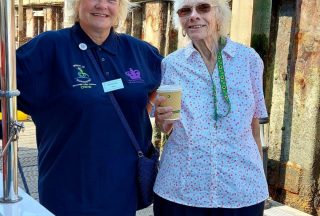Dementia is a set of symptoms that might include memory loss and difficulties with thinking, problem-solving or language.
Dementia is caused when the brain is damaged by disease. Many of these diseases are associated with an abnormal build-up of proteins in the brain. This build-up then causes nerve cells to function less well and ultimately die. As the nerve cells die, different areas of the brain shrink. The most common cause of dementia is Alzheimer’s disease, but this is not the only cause.
Dementia is not a natural part of aging. It is caused when a disease damages nerve cells in the brain. Nerve cells carry messages between different parts of the brain, and to other parts of the body. As more nerve cells are damaged, the brain becomes less able to work properly.
Dementia can be caused by many different diseases. These diseases affect the brain in different ways, resulting in different types of dementia.
Types of Dementia
There are four main types. Dementia affects everyone differently, however each type has some common early symptoms.
Alzheimer’s disease – Alzheimer’s disease is the most common type of dementia. The first signs of Alzheimer’s disease are problems with memory, thinking, language or perception.
Vascular dementia – Vascular dementia is the second most common type of dementia. Common early signs of vascular dementia include problems with planning or organising, making decisions or solving problems.
Dementia with Lewy bodies – Dementia with Lewy bodies is a type of dementia caused by Lewy bodies, which are clumps of protein in the cells of the brain. Lewy bodies cause a range of symptoms, some of which are shared with Alzheimer’s disease and some with Parkinson’s disease. Dementia with Lewy bodies causes symptoms that are not usually seen in Alzheimer’s disease. These include hallucinations, problems staying fully awake, difficulties with movement and very disturbed sleep.
Frontotemporal dementia – Frontotemporal dementia is one of the less common types of dementia. It is sometimes called Pick’s disease or frontal lobe dementia. Common symptoms of FTD include changes to personality and behaviour and/or difficulties with language.
How might it affect the person I am caring for?
The specific symptoms that someone with dementia experiences will depend on the parts of the brain that are damaged and the disease that is causing the dementia. Some of the common sorts of problems they might have is:
- Poorer day-to-day memory – for example, difficulty recalling events that happened recently, or asking questions repeatedly that have already been answered.
- Difficulty concentrating, planning or organising – for example, unable to make decisions or find it hard to problem solve or carrying out a sequence of things to complete a task.
- Difficulties with language – for example, finding it hard to follow a conversation or not being able to think of the right word for something.
- Poorer visuospatial skills – for example, problems judging and seeing objects in three dimensions.
- Feeling disorientated – for example, losing track of the day or date, or becoming confused about where they are. Dorset Police have information on the Herbert Protocol – carersupportdorset.co.uk/news/herbert-protocol-helping-those-caring-for-someone-with-dementia – a simple risk-reduction tool to help the police in their search for people with dementia who go missing.
Coping with these changes as a carer
It can be difficult to see a loved one struggle to remember, or change from the person you knew. Dementia can affect their behaviour and mood and this can be difficult to cope with. For instance, they may become frustrated or irritable, apathetic or withdrawn, anxious, easily upset or unusually sad. With some types of dementia, the person may see things that are not really there or strongly believe delusions that are not true.
If you are struggling with their changes in behaviour, Alzheimer’s Society has some great resources for coping and managing challenging, difficult or upsetting behaviour in someone with dementia. You can read more on the Alzheimer’s Society website – alzheimers.org.uk/about-dementia/symptoms-and-diagnosis/symptoms/behaviour-changes
Some key things to think about to help manage these symptoms may be:
- A regular schedule or daily routine
- Doing activities together and talking to the person you care for as much as you can
- Arranging activities that they like or used to like
- Try not to argue even when they beliefs or thoughts are not true, this can become more distressing for both of you
- Keep familiar or sentimental items nearby so they can be used as a means of comfort.
If you are waiting for a memory test appointment for your cared for, Next Steps offers information about what to expect and where to go for support through this process and if you get a diagnosis – nextsteps.org.uk
What support is available?
Alzheimer’s Society
Alzheimer’s Society are a vital source of support and a powerful force for change for everyone affected by dementia. They offer expert advice and guidance and support through the most challenging days. They have dementia advisers who have an extraordinary depth and breadth of knowledge. Combined with their dedication and compassion, they are unstoppable when it comes to providing personalised solutions that make a real difference to people with dementia and their carers.
Alzheimer’s Society run a National Dementia Helpline: 0333 150 3456
Dementia Carers
Dementia Carers provide free courses designed and delivered by healthcare professionals, that will help you develop skills and build confidence to navigate the highs and lows. Learning how to make your life manageable and maintain your own health and well-being is vital when you’re caring for someone with dementia. They will give you practical tips that you can use every day.
They give you the opportunity to meet and connect with people in a similar situation, and they are there to listen too.
For advice and support call: 0800 652 1102
To book a course you can call them on 0203 5400 710. A full list of their courses can be found at – dementiacarers.org.uk
You can also email them at info@dementiacarers.org.uk
Help & Care
Help & Care is a Dorset charity that has a vision of people living the lives they choose. They are currently running a Dementia Coordinator service which is available to everyone across Dorset, age 18 and over including support for immediate carers and loved ones.
Support and advice will include coping with memory loss, benefits entitlement and how to claim, information on care options and how to access these and referral to Age UK for Cognitive Stimulation Therapy if applicable.
For further queries please contact Help & Care at memory@helpandcare.org.uk, or telephone them on: 0300 123 1916. You can also visit helpandcare.org.uk for more information.
What activities could I do with the person I’m caring for?
Dorset Libraries Reminiscence – There are a number of groups across Dorset with different themes each session to give you a chance to reminiscence with the person you care for and others.
For example, many Dorset libraries provide Reminiscence groups. You can find out more about their events on the Dorset libraries website – dorsetcouncil.gov.uk/libraries-history-culture/libraries/libraries
Stepping into Nature across Dorset – Provide outdoor activities for people with dementia and their carers. Their website provides resources and places to visit with the person you care for – dorsetaonb.org.uk/project/stepping-into-nature
Alzheimer’s Society – Provide a number of support and activity groups for those with dementia and their carers. You can find your local one here – alzheimers.org.uk/find-support-near-you
Other local support groups for carers and those for dementia:
There are the following support groups and organisations in Dorset for carers and those with dementia:
- Step Ahead group, Blandford Forum – first Wednesday of each month for carers of people with memory problems. Contact 01258 480762.
- Tricuro Shaftesbury Plus – supports people living with dementia in Shaftesbury and surrounding areas and is open Monday- Saturday, 9am-4pm. Contact 01747 854959 or email enquiries@tricuro.co.uk
- Growing Compassionate Communities – offers dementia walks, reminiscence sessions and carpet bowls in Corfe Mullen – growingcompassion.org.uk/about-us
Memory cafes, music and singing
- Age UK Wareham Melodies for Memories – first and third Friday each month. Contact Natalie Betts 07747 533252.
- Age UK Melodies for Memories – Music and songs for cognitive stimulation (west Dorset). Contact Hilary Foggo – 01305 269444.Beaminster Melodies For Memories – every other Tuesday 10.30am-12.15pm at Abbeyfield House.
- The Forget-me-not Songsters – meets at Community 2000, Easton, Portland every Wednesday, 10am-11.30am. Contact 01305 823789.
Looking after yourself
Although, you are not the person experiencing dementia it can have a huge impact on you as a carer. You might know the person you care for is behaving in certain ways because of the dementia but even so it can still be challenging to deal with and take a huge emotional toll.
Therefore, it’s important to have a space to talk about these changes and the effects it is having on you. This might be with a friend of relative. If you feel like you don’t have anyone to share this with you could register for our Here to Talk befriending service – carersupportdorset.co.uk/here-to-talk. It can also be useful to write out how you are feeling or what has been happening. This could also be done as a support service, such as emailing the Samaritans on jo@samaritans.org.



